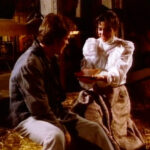Gillian Welch’s discography is a treasure trove for Americana enthusiasts, and within it lies “Look at Miss Ohio,” a song that resonates deeply with listeners. After immersing myself in Dave Rawlings Machine’s latest album, A Friend of a Friend, revisiting Welch’s collection led me back to this particular track. It’s a piece I’ve heard countless times, yet on this occasion, the intricate drum work within this quintessential Ohio Song truly captivated my attention.
The drums establish a rhythm that’s almost dreamlike, a somnambulist pulse that dictates the song’s tempo, perpetually on the verge of breaking free. This rhythmic foundation carries the song’s inherent melancholy, yet paradoxically, it steers it towards a sense of liberation. This release isn’t immediate or overt; it’s subtly introduced during the second refrain, emerging after Rawlings’ evocative guitar solo. Prior to this, Welch’s robust strumming of the guitar carries the song’s weight, creating a hesitant, almost uncertain progression. The deliberate absence of drums towards the song’s conclusion, momentarily spotlighting Welch’s guitar, offers a moment of reflection, as if Miss Ohio herself is reconsidering her path. The re-entry of the drums, guiding the song to its final notes, feels like a fittingly bold and decisive ending.
Beyond the captivating rhythm, the lyrical content of this ohio song is equally compelling. The line, “I wanna do right but not right now,” consistently stands out, encapsulating a universal sentiment of internal conflict. The narrative structure initially suggests the song might be unveiling the hidden story of a beauty queen. There’s an inherent human fascination with glimpsing beyond polished facades, discovering the imperfections beneath the surface of those who seem to possess it all. The struggle to choose the “right thing to do” is a relatable human experience, and this ohio song taps into that common ground.
However, a more intriguing interpretation emerges when considering that the song might transcend the beauty queen narrative entirely. It could simply portray a woman, any individual, who feels compelled to conceal their true self behind a carefully constructed image or reputation. This perspective amplifies the song’s profound and universal appeal. The woman depicted feels constrained by external expectations: her mother’s pressure for marriage (“pushing that wedding gown”) and her lover’s possessive embrace (“arm wrapped around her like a regimental soldier”). Unspoken pressures and societal expectations permeate the verses, emotions and desires she entrusts to Rawlings’ guitar solos rather than explicit words. This interpretation deepens the song’s melancholic undertones, as her desires aren’t for grand, unattainable ambitions but for a simpler, more authentic existence. “Look at Miss Ohio” becomes a poignant exploration of the grass being greener elsewhere, a yearning for a different kind of everyday life. Her fantasy isn’t world domination, but rather, a life imagined in Atlanta.
Then again, perhaps “Atlanta” was chosen simply for its rhyme with “fantasy.” It’s possible to delve too deeply into interpretation. Regardless, the enduring power of this ohio song lies in its multifaceted nature, inviting listeners to connect with its themes of longing, internal conflict, and the search for personal liberation. And while we ponder the depths of “Look at Miss Ohio,” the anticipation for new music from Gillian Welch remains ever-present.

